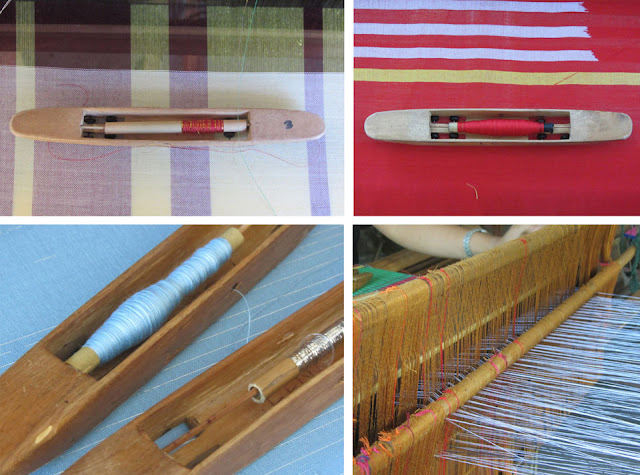Building chairs, building lives
Did you ever wonder who made the school chairs that give students comfort while in school?
They are members of the Association of Differently-abled Persons in Iloilo Multi-Purpose Cooperative. “It is mandated and through the Magna Carta for Persons with Disabilities that .5 percent of the Department of Education’s needs, like the school furniture and chairs, must be catered by the PWD sector. That’s more or less one percent of the national budget,” according to Louie Arches Posa, manager of the cooperative.
The DepEd contract states that they should finish the chairs within 150 days.
Jeremias Balleza, 34, for one, feels lucky to have been given this chance. “Working at the cooperative has helped me and my family. I am married with one child. Because of my work, we now have a home. The training given to us also helped. I learned electronics and carpentry,” he said.
Balleza and his fellow workers now number 35, who also cater to the school chairs of the Uygongco Foundation, Inc. and furniture of private individuals.
But the future of the cooperative and its dependents are at stake after the memorandum of agreement between ADPI and the Technical Education and Skills Development Authority (Tesda) Regional Office in Zamora Street, Iloilo City has expired in 2010 and is in danger of non-renewal.
“They reduced our area because they said they will use the place. Then, the next year, another area was taken. Our space gradually decreases. It’s like they’re telling us to get ready because our MOA might not be renewed,” Posa said.
“Somebody from Manila called me and told me that there was a negative recommendation from Iloilo, thus our MOA will not be extended. Since our MOA expired, we have been writing to them about the renewal but their Legal (Department) said there’s none yet.”
Posa said the cooperative finds the Tesda location helpful as they need not pay rent and only pay for the use of electricity.
Posa said the recommendation why their MOA shouldn’t be renewed was first, the cooperative’s operation is hazardous to some of Tesda’s equipment. “But we have been here for seven years. Why did they say this just now?” Posa questioned.
“Second, we were not able to comply with the Environmental Compliance Certification (ECC). Third, they said we should have our own power line. But according to the Panay Electric Company, we cannot have our own line because we do not own the place. Fourth, there’s a sanitary issue concerning saw dust. But, Tesda has even made use of the waste materials from the cooperative. For one, we got rid of the stagnant water at the back portion of the compound because we filled it with sawdust,” Posa said.
Posa is quite worried because they currently have a project that will be finished in July and an incoming project which is an allotment of the DepEd for them. Thus, possible ejectment will pose a problem for them.
“Moving out will incur us a lot of money. We spent a lot in order to establish this place. In fact, if you read between the lines of the contract, all the equipment and development might go to them,” he said.
Posa said that it is provided by law that PWDs can use any building, abandoned or unused for their purpose.
“We’d like to appeal to Tesda, since we have been here for seven years, to give us a chance to improve. We have nowhere to turn to. We appeal for them to either extend our stay or make our stay permanent and help us do something to solve the problems. This is for the families who will be affected,” Posa said.
He narrated that one member used to be begging just to survive, after being given the chance to work at the cooperative and given training, he is now able to live a decent life.
If the MOA with Tesda isn’t renewed, Posa hopes for a land donation where they can build their own workshop and training center for PWDs.
E-BAMBOO
Meanwhile, the cooperative is now helping in the government’s thrust of totally banning logging through the creation of the engineered bamboo (e-bamboo). It’s another reason why they need an area where they can show people that special products like the e-bamboo were made by PWDs.
“There is an architect group in Cebu that is interested to market this. We are now in preliminary talks,” Posa said.
He added that the Department of Trade and Industry will give them equipment to create more e-bamboo products because DepEd is also mandated that 25 percent of its requirements must be made of e-bamboo.
“Our e-bamboo is better than vinyl. It’s even better than the e-bamboo that China is trying to get into the country. China’s product is beautiful in the outside but inside it contains softwood or engineered wood particles. Ours is solid bamboo,” Posa said.
THE PWDS GROUP
Apart from the cooperative, the ADPI also handles social programs that will benefit PWDs. “Our ADPI-NGO in charge of our social programs organize PWDs in every municipality. Our center in Jaro Plaza provides a clinic to children with disabilities and PWDs,” Posa said.
In the 41 towns of Iloilo, the association has organized 23 towns already.
He added that they also get funding from the Christopher Blinden Mission based abroad, but that would end this year. “We are also appealing for the extension of such funding for another five years,” he said adding that there are still towns that need to be organized.
He added that New Lucena is a show window of a local government’s compliance to the accessibility law. The town has reaped awards for having accessible facilities, government offices and promoting the participation of PWDs and senior citizens, and focusing on a barrier-free environment from a person’s home to the town proper, to the market, and to other parts of the town.*
They are members of the Association of Differently-abled Persons in Iloilo Multi-Purpose Cooperative. “It is mandated and through the Magna Carta for Persons with Disabilities that .5 percent of the Department of Education’s needs, like the school furniture and chairs, must be catered by the PWD sector. That’s more or less one percent of the national budget,” according to Louie Arches Posa, manager of the cooperative.
The DepEd contract states that they should finish the chairs within 150 days.
Jeremias Balleza, 34, for one, feels lucky to have been given this chance. “Working at the cooperative has helped me and my family. I am married with one child. Because of my work, we now have a home. The training given to us also helped. I learned electronics and carpentry,” he said.
Balleza and his fellow workers now number 35, who also cater to the school chairs of the Uygongco Foundation, Inc. and furniture of private individuals.
But the future of the cooperative and its dependents are at stake after the memorandum of agreement between ADPI and the Technical Education and Skills Development Authority (Tesda) Regional Office in Zamora Street, Iloilo City has expired in 2010 and is in danger of non-renewal.
“They reduced our area because they said they will use the place. Then, the next year, another area was taken. Our space gradually decreases. It’s like they’re telling us to get ready because our MOA might not be renewed,” Posa said.
 |
| ADPI Multi Purpose Cooperative members |
“Somebody from Manila called me and told me that there was a negative recommendation from Iloilo, thus our MOA will not be extended. Since our MOA expired, we have been writing to them about the renewal but their Legal (Department) said there’s none yet.”
Posa said the cooperative finds the Tesda location helpful as they need not pay rent and only pay for the use of electricity.
Posa said the recommendation why their MOA shouldn’t be renewed was first, the cooperative’s operation is hazardous to some of Tesda’s equipment. “But we have been here for seven years. Why did they say this just now?” Posa questioned.
“Second, we were not able to comply with the Environmental Compliance Certification (ECC). Third, they said we should have our own power line. But according to the Panay Electric Company, we cannot have our own line because we do not own the place. Fourth, there’s a sanitary issue concerning saw dust. But, Tesda has even made use of the waste materials from the cooperative. For one, we got rid of the stagnant water at the back portion of the compound because we filled it with sawdust,” Posa said.
Posa is quite worried because they currently have a project that will be finished in July and an incoming project which is an allotment of the DepEd for them. Thus, possible ejectment will pose a problem for them.
“Moving out will incur us a lot of money. We spent a lot in order to establish this place. In fact, if you read between the lines of the contract, all the equipment and development might go to them,” he said.
Posa said that it is provided by law that PWDs can use any building, abandoned or unused for their purpose.
“We’d like to appeal to Tesda, since we have been here for seven years, to give us a chance to improve. We have nowhere to turn to. We appeal for them to either extend our stay or make our stay permanent and help us do something to solve the problems. This is for the families who will be affected,” Posa said.
He narrated that one member used to be begging just to survive, after being given the chance to work at the cooperative and given training, he is now able to live a decent life.
If the MOA with Tesda isn’t renewed, Posa hopes for a land donation where they can build their own workshop and training center for PWDs.
E-BAMBOO
Meanwhile, the cooperative is now helping in the government’s thrust of totally banning logging through the creation of the engineered bamboo (e-bamboo). It’s another reason why they need an area where they can show people that special products like the e-bamboo were made by PWDs.
“There is an architect group in Cebu that is interested to market this. We are now in preliminary talks,” Posa said.
He added that the Department of Trade and Industry will give them equipment to create more e-bamboo products because DepEd is also mandated that 25 percent of its requirements must be made of e-bamboo.
“Our e-bamboo is better than vinyl. It’s even better than the e-bamboo that China is trying to get into the country. China’s product is beautiful in the outside but inside it contains softwood or engineered wood particles. Ours is solid bamboo,” Posa said.
 |
| Louie Arches Posa, manager of ADPI Multi Purpose Cooperative |
THE PWDS GROUP
Apart from the cooperative, the ADPI also handles social programs that will benefit PWDs. “Our ADPI-NGO in charge of our social programs organize PWDs in every municipality. Our center in Jaro Plaza provides a clinic to children with disabilities and PWDs,” Posa said.
In the 41 towns of Iloilo, the association has organized 23 towns already.
He added that they also get funding from the Christopher Blinden Mission based abroad, but that would end this year. “We are also appealing for the extension of such funding for another five years,” he said adding that there are still towns that need to be organized.
He added that New Lucena is a show window of a local government’s compliance to the accessibility law. The town has reaped awards for having accessible facilities, government offices and promoting the participation of PWDs and senior citizens, and focusing on a barrier-free environment from a person’s home to the town proper, to the market, and to other parts of the town.*






